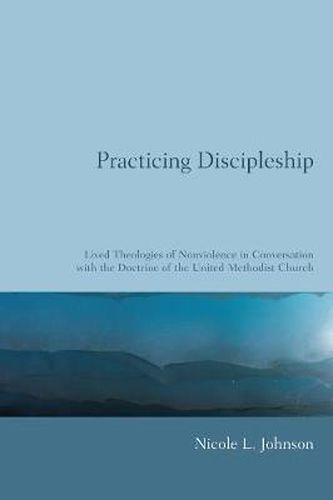Readings Newsletter
Become a Readings Member to make your shopping experience even easier.
Sign in or sign up for free!
You’re not far away from qualifying for FREE standard shipping within Australia
You’ve qualified for FREE standard shipping within Australia
The cart is loading…






This title is printed to order. This book may have been self-published. If so, we cannot guarantee the quality of the content. In the main most books will have gone through the editing process however some may not. We therefore suggest that you be aware of this before ordering this book. If in doubt check either the author or publisher’s details as we are unable to accept any returns unless they are faulty. Please contact us if you have any questions.
Despite a plurality of doctrinal statements on war, peace, and nonviolence, some United Methodists sustain a commitment to nonviolence. Through qualitative research, Practicing Discipleship draws out lived theologies of nonviolence in order to understand how nonviolent United Methodists define, ground, and practice nonviolence, and to give that voice opportunity to challenge church doctrine and thereby the wider church. An analysis of statements from the Book of Disciplines and the Book of Resolutions reveals the plurality of Methodist teachings on moral issues related to war and peace. While such plurality is indicative of the inclusive tradition of United Methodism, Johnson shows that it also causes confusion, thus hindering the vitality and authority of the church’s witness. This study’s qualitative analysis of in-depth interviews with twelve nonviolent United Methodists reveals a lived theology rooted in Scripture and theological reflection: it points particularly to a christocentrism that posits nonviolence as central to Christ’s teachings and example. While study participants affirm the tradition of openness in the United Methodist Church, they also call for more tangible and extensive support for and education about nonviolence as a faithful option for Christians. Through amicable and constructive practical-theological dialogue, doctrinal plurality, and ecclesial openness are affirmed as appropriate and possible only within the context of the church’s profound commitment to serious discipleship, which includes transformation toward nonviolence. Implications of this interaction include developing and adopting a more truthful conception of a nonviolent ethics, moving toward broadly conceived Christian formation in nonviolence, and fostering ongoing ecclesial dialogue about difficult moral issues of war, peace, and nonviolence.
$9.00 standard shipping within Australia
FREE standard shipping within Australia for orders over $100.00
Express & International shipping calculated at checkout
This title is printed to order. This book may have been self-published. If so, we cannot guarantee the quality of the content. In the main most books will have gone through the editing process however some may not. We therefore suggest that you be aware of this before ordering this book. If in doubt check either the author or publisher’s details as we are unable to accept any returns unless they are faulty. Please contact us if you have any questions.
Despite a plurality of doctrinal statements on war, peace, and nonviolence, some United Methodists sustain a commitment to nonviolence. Through qualitative research, Practicing Discipleship draws out lived theologies of nonviolence in order to understand how nonviolent United Methodists define, ground, and practice nonviolence, and to give that voice opportunity to challenge church doctrine and thereby the wider church. An analysis of statements from the Book of Disciplines and the Book of Resolutions reveals the plurality of Methodist teachings on moral issues related to war and peace. While such plurality is indicative of the inclusive tradition of United Methodism, Johnson shows that it also causes confusion, thus hindering the vitality and authority of the church’s witness. This study’s qualitative analysis of in-depth interviews with twelve nonviolent United Methodists reveals a lived theology rooted in Scripture and theological reflection: it points particularly to a christocentrism that posits nonviolence as central to Christ’s teachings and example. While study participants affirm the tradition of openness in the United Methodist Church, they also call for more tangible and extensive support for and education about nonviolence as a faithful option for Christians. Through amicable and constructive practical-theological dialogue, doctrinal plurality, and ecclesial openness are affirmed as appropriate and possible only within the context of the church’s profound commitment to serious discipleship, which includes transformation toward nonviolence. Implications of this interaction include developing and adopting a more truthful conception of a nonviolent ethics, moving toward broadly conceived Christian formation in nonviolence, and fostering ongoing ecclesial dialogue about difficult moral issues of war, peace, and nonviolence.